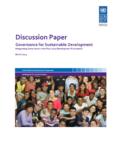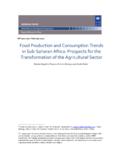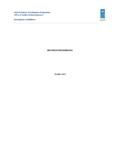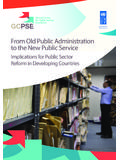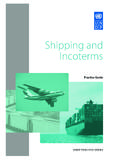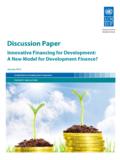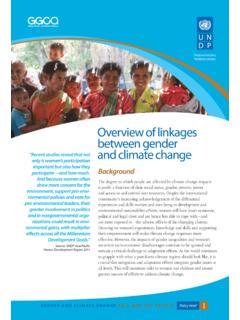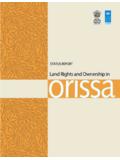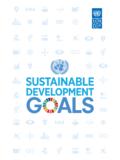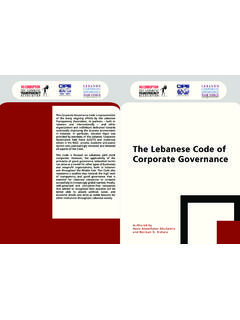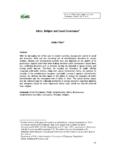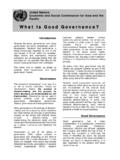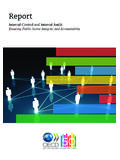Transcription of Background Paper - Rule of Law and Sustainable …
1 1 Background Paper : Overview on the rule of law and Sustainable development for the Global Dialogue on rule of law and the Post 2015 development Agenda Louis Alexandre Berg and Deval Desai1 Draft, August 2013 Executive Summary This Paper lays out a framework for discussions on the role of the rule of law in the post 2015 agenda. It summarizes the evidence base for the relationship between the rule of law and development , highlights lessons from rule of law development programming and the experience of the MDGs, and points to options for how the rule of law might be incorporated into the post 2015 development agenda. The Paper emphasizes three themes. First, it recognizes the general commitment among policymakers to the importance of the rule of law to development . The deliberations to flesh out the post 2015 agenda provide a unique opportunity to translate this commitment to the rule of law into action.
2 Second, it highlights the importance of context and specificity. The rule of law is a concept that resonates across borders and boundaries while reflecting a diverse set of perspectives rooted in societies culture, history, politics, institutions and conceptions of justice. Third, it describes the multi faceted, cross disciplinary, and sometimes contested nature of the evidence base, and emphasizes the importance of understanding the particular pathways between the rule of law and development . Efforts to define commitments, targets and indicators should clarify the particular pathways they are trying to promote while building on and strengthening the existing evidence base. The starting point for incorporating the rule of law into the post 2015 agenda should be an understanding of the nature of the rule of law and its relationship to development .
3 We take an inclusive view of the rule of law , which incorporates a diversity of perspectives while recognizing international norms. The rule of law is a system of rules and norms, a set of institutions, and an outcome of development , and a feature of the processes that cut across sectors to enable development to advance. At the same time, specific functions of the rule of law and its relationship to development are increasingly recognized. Drawing on a wide range of empirical literature and practical experience, the Paper lays out core development functions of the rule of law , including: Enabling economic development , Citizenship and social and economic justice. Preventing, mitigating and deterring conflict, crime and violence Strengthening accountability and checks on power, and reducing corruption Enhancing the fair allocation of services 1 Georgetown and Harvard Law School respectively.
4 Correspondence welcome at and This overview represents a more detailed version of the findings of the Policy Brief for policy makers shaping the Post 2015 development agenda, available at _rule_of_law_and_the_post 2015_develo. It is intended to complement the Policy Brief, providing a more detailed basis for discussions and consultations on the rule of law and development in the context of the development of the post 2015 development goals. We are grateful to Shelley Inglis, Aparna Basnyat, Rosie Wagner, and the Paper s internal and external peer reviewers for their assistance, comments and guidance. 2 Protecting the environment and natural resources Understanding these relationships, the specific pathways between the rule of law and development that each implies, and the evidence base for each, is essential to crafting effective goals and targets.
5 development policy should also consider the trade offs and tensions among these various functions. The post 2015 agenda should also take into consideration the history of rule of law development efforts as well as the experience of the MDGs. While development actors have sought to promote the rule of law for at least five decades, evidence of impact has been mixed. Several critiques have arisen to point out specific limitations and suggest alternative approaches. First, programs have tended to presume linear trajectories of change. Second, they have not incorporated sufficiently long time horizons. Third, they have tended to transplant models or goals from elsewhere without considering the contextual basis of change. Fourth, they have not sufficiently supported in country political coalitions to underpin the development of the rule of law .
6 In response to these concerns, development actors have moved toward evidence based problem solving approaches . These approaches focus on the problems experienced by end users of rule of law systems, and examine rule of law challenges that cut across development sectors and outcomes. Building on these advances in the rule of law field, we suggest that retaining some flexibility in defining goals, targets and indicators to reflect the unique challenges of particular societies within broadly understood conceptions of the rule of law . As a basis for goals and indicators for the rule of law in the post 2015 agenda, the Paper reviews prior and ongoing efforts to measure the rule of law . A crucial step in setting targets is defining clear and measurable concepts, rooted in the evidence for particular pathways between the rule of law and development .
7 The range of measurement approaches have emphasized varying conceptions and methodologies, ranging from measures of institutional performance and compliance with international norms, to surveys of user experience and perception, to broad indices and baskets of indicators that aim to aggregate various concepts. Given the multi dimensional nature of the rule of law , each of these approaches carries particular trade offs, including between specificity and breadth of context; universal application and context specificity; sensitivity of measurement and comprehensiveness; as well as in regards to considerations like cost, reliability, and measurement. The design of targets and indicators should also consider the particular incentives they create and the risk of unintended consequences of focusing on a particular concept or indicator.
8 With these lessons in mind, the post 2015 agenda provides a unique opportunity to build upon global political commitments to the rule of law . The wide range of commitments reflected in international policy documents, conventions and resolutions of multilateral and regional organizations around the world displays both the broad resonance across countries of the importance of the rule of law to development and the varied conceptions of and approaches to measuring countries adherence to the rule of law . The experience of the MDG process also highlighted the importance of the rule of law , as several country reports emphasized the importance of elements of the rule of law to achieving objectives. During the post 2015 process, civil society actors have advocated for rule of law goals and indicators, and recent consultations have emphasized its importance on issues ranging from personal security to governance.
9 Three general approaches to incorporating the rule of law into the post 2015 development agenda could be considered. These approaches are not mutually exclusive and could be adopted in concert: 3 Define a common rule of law goal with a flexible basket of indicators that can be tailored to country contexts. A rule of law goal would signal the importance of the rule of law as an outcome of development on par with other outcomes such as poverty reduction and health, though it would require consensus on a particular function of the rule of law for development . Adopt the rule of law as a high level enabling goal, which would commit countries to make national level policy changes that enable progress on other development goals. This approach recognizes that the rule of law is not just an end in itself, but that it also enables a broader range of development outcomes.
10 Incorporate the rule of law across development goals, through rule of law specific targets and indicators in support of other goals. This approach highlights the importance of the rule of law across development , without defining it as a desirable end in itself. 4 Introduction This Paper lays out a framework for discussions about the rule of law in the post 2015 agenda. It is structured around three themes. The first is the increasing recognition among policymakers of the importance of the rule of law to development . This is particularly true in the context of the post 2015 world. The rule of law has shaped development processes through the operation of laws, regulation and enforcement; enabled conditions and capacities necessary to development outcomes; and remained a core development end in itself.
